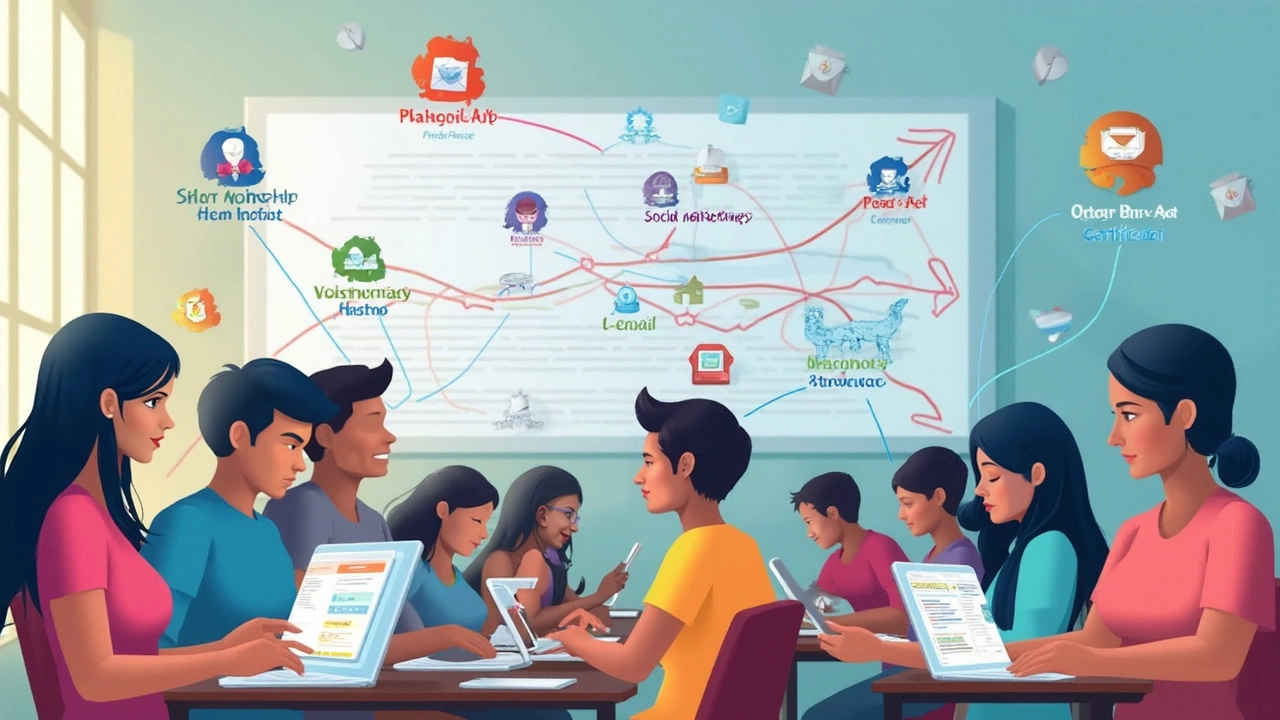
Heard some folks say you can learn digital marketing in a weekend? Not so fast. The truth is, these courses come in all shapes and sizes—you can knock out some basics in a few hours, but if you want solid skills, you’re looking at weeks or even months.
Most people start Googling 'how long does a digital marketing course take' because they want results fast, but it really depends on what you’re after. If you only want the basics—like getting your head around SEO or social media ads—you can get the gist in under a week with a crash course. But to actually use these skills for real campaigns or to get a job, you’ll need to dig deeper. Expect to spend at least a month for standard certificates, and up to six months for those big bootcamps or advanced programs.
There are no shortcuts, but the good news is, you don’t always have to quit your job or lock yourself in a room for half a year. Plenty of part-time courses let you learn as you go. And if your schedule is nuts, some platforms offer self-paced tracks—you control the timeline.
- Why Course Lengths Vary So Much
- Crash Courses: Quick Wins and Limitations
- Standard Certificate Programs: The Real Commitment
- Bootcamps and Advanced Tracks
- Tips to Choose (and Finish) the Right Course
Why Course Lengths Vary So Much
Not all digital marketing course duration timelines are created equal. You might see one course that takes 5 hours, and another that takes 5 months. Why the huge difference? It mostly comes down to how deep the course goes and who it’s designed for.
First, think about the course format. Here’s how much that can matter:
- Self-paced online courses let you move as fast or slow as you want. Some people binge-watch everything in a weekend, others spread it out across months.
- Instructor-led bootcamps often run on a set schedule and usually last from 8 to 24 weeks. They pack a ton of content into short chunks.
- University-backed diploma programs can run for six months or even a year because they mix in live lectures, group work, and tests.
The topics covered make a huge difference, too. A quick intro to social media ads will take way less time than a course that covers SEO, analytics, email, paid search, and content planning all in one go. Some courses are designed just to help you pass a certification exam, while others actually make you run campaigns or build a portfolio.
Then there’s skill level. Beginner stuff is quicker to learn, while advanced skills for things like PPC or data analytics take longer and often come with more assignments and hands-on projects.
To give you a better picture, check this out:
| Type | Average Length | Content Depth |
|---|---|---|
| Crash Course | 2-7 hours | Basic concepts, quick wins |
| Standard Certificate | 1-3 months | All main digital channels |
| Bootcamp | 3-6 months | Advanced, hands-on, projects |
| Diploma/Degree | 6-12 months | In-depth, academic level, portfolio |
Your available time matters, too. Someone with only four hours a week will finish much slower than someone who can give two hours daily. Most course sites will show you an average weekly commitment, but your own pace is what really counts.
So, when you’re checking out a digital marketing course, look past the time estimates and actually read what’s packed inside before you click 'enroll.'
Crash Courses: Quick Wins and Limitations
If you just want to dip your toes in, a digital marketing course that calls itself a "crash course" can give you a quick peek. Most of these last anywhere from a few hours to maybe two days, usually packed into live webinars or binge-worthy video lessons. Google's Digital Garage, for example, has modules that can be finished in just a weekend if you really power through.
Here’s what you actually get in these bite-sized courses:
- Intro to core skills: covers email marketing, SEO, pay-per-click, or social media basics
- Simple, practical demos—think how to set up a Facebook ad or write a basic SEO title
- Light quizzes or a basic certificate when done
Sounds great, but there’s a catch. Crash courses are awesome for a preview, but you probably won’t be job-ready after. They usually skip deep dives on strategy, analytics, and actual campaign work. If you want to show off a real project or ace an interview, you’ll want more than what you get in a few evening sessions.
It’s worth knowing: these quick courses are super popular. In fact, as of 2024, the most popular digital marketing crash courses on Coursera and Udemy saw over 200,000 enrollments each. People love fast learning. But most students who only do a crash course still go on to longer-form certificates to get those real-world projects under their belt.
So, who should use these? Best for beginners, business owners who want to “speak digital,” or job seekers who want to brush up before a big interview. If you want a solid skillset or an actual digital marketing course certificate, you’ll need to invest more time.

Standard Certificate Programs: The Real Commitment
When you’re aiming for a digital marketing course that actually means something to employers, standard certificate programs are where most people land. These aren’t crash courses—they’re offered by places like Google, HubSpot, or even big universities, and they demand a real chunk of your time.
The average length for most standard certificate programs is 2 to 4 months if you’re studying part-time, which usually means around 3-7 hours a week. For example, the Google Digital Marketing & E-commerce Certificate takes about 6 months at 5 hours per week, but you can wrap it up sooner if you double your pace. HubSpot’s Digital Marketing Certification averages around 9 hours total, so you could finish in a week if you binge it, but most folks break it up over a month to really absorb everything.
The reason these programs take longer is simple: they cover more ground. You’ll go deeper into topics like SEO, email marketing, PPC ads, analytics, and content planning—basically everything you need to run a real marketing campaign from scratch. Plus, most of these courses now include hands-on assignments, quizzes, and sometimes even real projects for your portfolio.
Here’s a quick comparison of popular options:
| Course | Duration (Average) | Hours/Week |
|---|---|---|
| Google Digital Marketing | 3-6 months | 5 |
| Meta Social Media Marketing | 3-4 months | 3-5 |
| HubSpot Digital Marketing | 2-4 weeks | 2-3 |
| Coursera Digital Marketing Specialization | 4-6 months | 4-6 |
If you want to earn an actual certificate employers recognize—and maybe even get access to career support or a community—stick with these standard programs. Block out time each week, stay consistent, and you’ll be surprised how quickly you build real digital skills.
Bootcamps and Advanced Tracks
If you're aiming for a serious career jump or want to truly master digital marketing campaigns from start to finish, digital marketing bootcamps and advanced programs are built for you. These are nothing like quick crash courses; they’re packed schedules, more in-depth, and honestly a bit intense. Most bootcamps run between 8 to 24 weeks. That’s two to six months of regular, hands-on learning, and you usually need to commit at least 10-20 hours per week. Some require more, especially if you go for a full-time option.
The cool part? Bootcamps don’t just lecture you—they push you to work on live projects, real ad campaigns, and group assignments. This is where you actually learn to run Facebook Ads, Google Ads, email funnels, analytics, and all the stuff agencies want. For example, Google’s Digital Marketing & E-commerce Certificate lasts for about six months at around 5-10 hours per week, while General Assembly’s bootcamp often takes 10-12 weeks full-time, with daily live sessions and plenty of deadlines.
Here’s a look at the typical commitment for a few popular programs:
| Bootcamp/Program | Length | Weekly Hours |
|---|---|---|
| General Assembly Digital Marketing Bootcamp | 10-12 weeks | 20-40 hours |
| Google Digital Marketing & E-commerce | 6 months | 5-10 hours |
| BrainStation Digital Marketing Diploma | 12 weeks (full-time) 24 weeks (part-time) | 20-35 hours 10-15 hours |
Most people pick bootcamps for networking, real feedback from working marketers, and the confidence that comes from doing the actual work instead of just reading slides. Expect regular deadlines, group work, surprise quizzes, and even job support or a mentor in many cases.
- If you’re switching careers, this is the type of digital marketing course companies respect.
- Expect to build a portfolio—almost every bootcamp will make you run social campaigns, write ads, and analyze metrics that you can show off later.
- Some bootcamps throw in job prep, mock interviews, and resume workshops within that timeline. Don’t ignore these—they actually help.
The commitment’s real, but so are the results. If you’re ready to invest time and want a structured path toward real-world skills, advanced tracks and bootcamps will get you there faster than self-guided learning. Just know what you’re signing up for—it’s a challenge, but one with a solid payoff at the finish line.

Tips to Choose (and Finish) the Right Course
Finding the best digital marketing course is a lot like picking out sneakers—looks cool in the ad, but it better fit your feet and not fall apart after one use. So, before you hit that sign-up button, here’s what matters most.
- Know your schedule. If you’re juggling work or college, look for part-time or self-paced options. Some platforms, like Coursera and LinkedIn Learning, let you learn at your own pace—ideal if life’s a bit chaotic right now.
- Check the course content. Legit programs should cover the must-haves: SEO, PPC, email marketing, social media, and analytics. If the syllabus looks like it was thrown together last night, move on.
- Certifications matter (sometimes). If you want your CV to stand out for real digital marketing jobs, pick courses with recognized certificates—think Google, HubSpot, or Meta BluePrint. Some hiring managers actually search for those keywords.
- Look at the trainer’s background. Trainers who’ve worked in the field (not just taught it) bring you real-world hacks, not just theory. Google their LinkedIn before you trust their strategy tips.
- Don’t ignore reviews and forums. Websites like Reddit and Quora are brutally honest. Search course names, and you’ll spot fake reviews a mile away.
Here’s a little motivation bomb from Neil Patel, co-founder of Neil Patel Digital:
“There are tons of courses out there, but sticking to a schedule and actually practicing what you learn is what separates good marketers from everyone else.”
If you’re someone who loves numbers, check this out—according to a 2024 survey by Digital Vidya, only about 35% of people actually finish online digital marketing courses. That means most folks get stuck or distracted along the way. How do you improve your odds?
- Set mini-goals. Instead of ‘finish 6 modules,’ aim for ‘one video a day’—less guilt, more progress.
- Apply what you learn right away. Got access to your cousin’s bakery’s Instagram? Use that for homework instead of just watching the course examples.
- Switch up where you study. Sometimes fresh scenery makes it easier to focus, even if it’s moving from your desk to the kitchen table.
Digital marketing course duration isn’t always the best indicator of value. Completion—actually applying those skills—matters most. Skip the fluff, pick a course that matches your goals and lifestyle, and lock in time on your calendar. That’s what keeps you from becoming another dropout stat.
